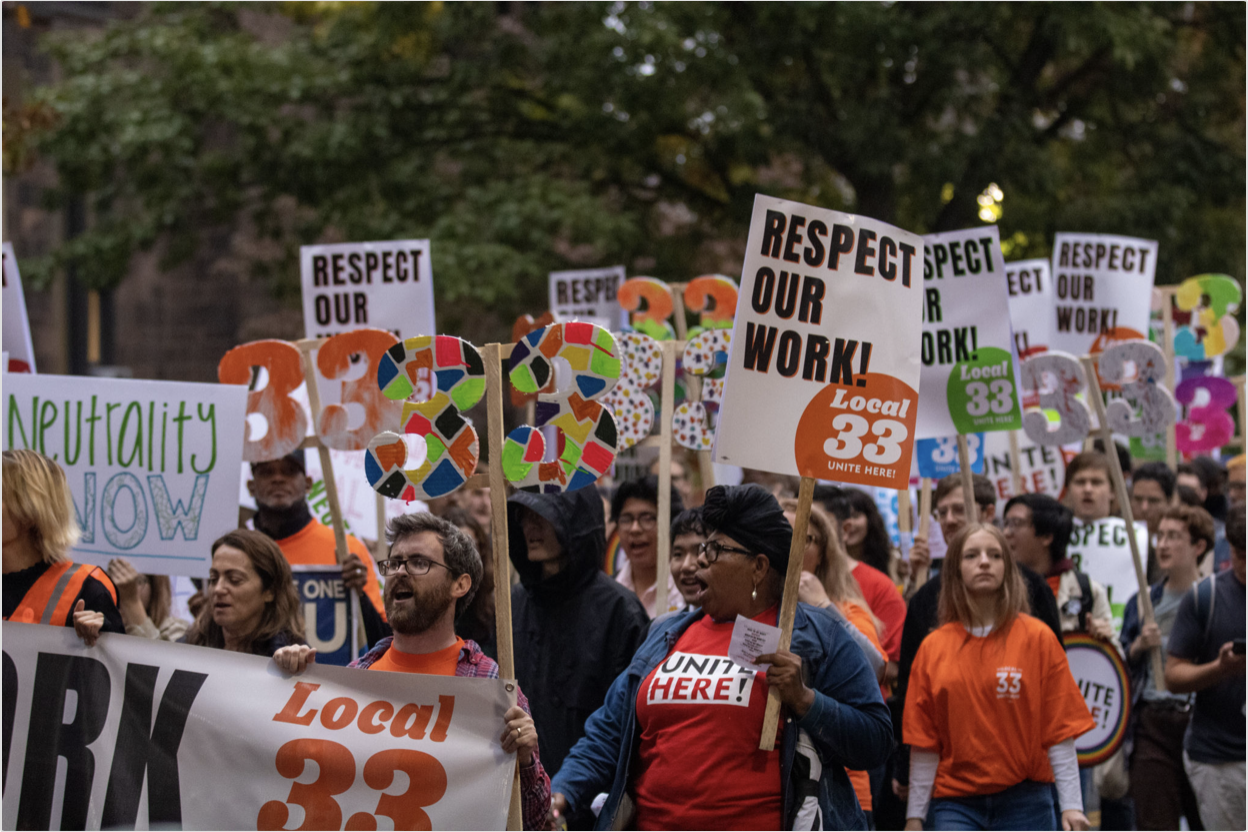Local 33 and Yale reach historic tentative agreement
After organizing for more than three decades, Local 33, the graduate and professional student union, secured higher pay, improved healthcare resources and union recognition until 2031 in a tentative agreement following nine months of negotiations with the University.

Gavin Guerrette, Senior Photographer
After 33 years of organizing and nine months of contract negotiations, Local 33 UNITE HERE, Yale’s graduate and professional student union, announced a tentative agreement with the University this afternoon.
The agreement secured higher pay, expanded healthcare and increased protections for international students. It promises an immediate 17.7-percent raise for stipend PhD grad workers next semester and a 30-percent raise over the course of the five-year contract, an annual $300,000 fund for out-of-pocket dental and health care expenses and a clear grievance procedure that includes a union steward.
Eligible graduate and professional student workers will vote on ratifying the tentative agreement on Dec. 15 and 16. If a majority of voters support ratification, the contract will go into effect immediately and expire on July 31, 2028.
“On December 8, Local 33 UNITE HERE and the university reached a tentative agreement on a five-year contract—an important milestone in our relationship,” Local 33 spokesperson Ian Dunn and University spokesperson Karen Peart wrote in a joint statement to the News.
The University and the union told the News that they will not give further comments to the press before the agreement is ratified.
In the tentative agreement, Yale agreed to recognize the union until 2031, even if changes in federal labor guidelines void the status of graduate students at private universities as union-eligible workers. Although the National Labor Relations Board, or NLRB, ruled in 2016 that private school graduate workers have the right to unionize, policy experts have long theorized that a Republican-appointed NLRB might attempt to overturn that ruling.
The tentative agreement protects the right of Local 33 to exist for the next two presidential administrations.
Graduate student workers at Yale have fought for union recognition since 1990, organizing protests, unauthorized elections and a virtually unprecedented 2017 hunger strike after Yale challenged the validity of eight department-based elections that the union won in 2016. Organizers often faced a “hostile” administration, according to former NLRB chairman William Gould in 2018, and drawn-out legal challenges by the University.
After President Donald Trump appointed a conservative member to the NLRB, Local 33 and other private university graduate unions withdrew their petitions to unionize in 2018, fearing that the Republican-majority board would overturn their right to unionize.
Local 33 began a new recognition campaign in the fall of 2021, a resurgence that would eventually lead to a landslide election in early 2023 with 91 percent of voters in favor of forming a union.
“Now, after nine months of intensive bargaining, we have a tentative agreement that raises the industry standard for graduate teachers and researchers,” Local 33 wrote in a summary of the tentative agreement emailed to members. “This document reflects all of our collective efforts; we would not be at this point without the dedication, energy, and organizing that so many Graduate Workers contributed.”
In their announcement of the tentative agreement, Local 33 celebrated “major wins” in five policy priorities as identified by a survey taken by over 2,200 graduate workers: better pay, quality health care, fair treatment and a grievance procedure, support for international graduate workers and support for graduate workers with families and dependents.
Over the course of the contract, PhD graduate workers with stipends will see a 30-percent raise. Students with salaried teaching positions in the Graduate School of Arts and Sciences and the Professional Schools will see their wages increase by 49 percent over the five-year contract. The tentative agreement includes cost-of-living adjustments for salaried positions in years with abnormally high inflation rates.
The agreement establishes three additional staff positions to improve graduate student workers’ access to health care services, particularly mental health resources. Spousal and dependent coverage will also expand.
The tentative agreement further provides international graduate workers with immigration assistance, allowing workers days or weeks off to resolve immigration issues and establishing an annual $40,000 fund to assist workers with legal expenses. Yale also agreed not to demand proof of immigration status or share worker information with United States or foreign government agencies.
The agreement outlines avenues for future University support for Local 33 organizing, including the provision of union bulletin boards and the concession that Local 33 workers will not be forced to cross the picket lines of Yale’s other unions.
Local 33’s reached its first tentative agreement far faster than graduate unions at peer institutions. Harvard University’s graduate student union took nearly two years to settle a first contract. At Brown University, negotiations took 17 months, and Columbia University reached an agreement with their union after three years of negotiations and a two-month strike by the union.
With the tentative agreement in hand, Local 33’s bargaining committee — a group of 16 graduate student workers — is planning to hold eight meetings between Dec. 11 and Dec. 14 with union members to discuss the agreement.
In the summary of the tentative agreement, the Local 33 bargaining committee recommended that graduate student workers vote to ratify the contract.
“As the bargaining committee, we enthusiastically recommend voting Yes to ratify this tentative agreement and begin next semester with a contract all of us can be proud of achieving,” the committee wrote.
The union will hold the contract ratification vote at 425 College St, UNITE HERE’s office in New Haven.
Nathaniel Rosenberg contributed reporting.







